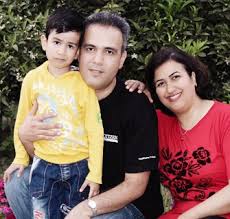Source: www.iranhumanrights.org

The authorities of Evin Prison have told imprisoned Baha’i educator Azita Rafizadeh that she will only be considered for furlough if she apologizes for teaching online classes to members of her faith.
“The prison authorities said she must sign a statement to repent for her work and promise that she will not work there again,” a family source told the Center for Human Rights in Iran (CHRI) on January 3, 2018. “But Azita said she has done nothing to repent for. She said she is proud of her work and if she went back in time she would do it again.”
Since October 2015, Rafizadeh and her husband Peyman Koushk-Baghi have been behind bars for teaching at the Institute for Higher Education (BIHE), an online learning service that is banned in Iran. Relatives are raising their eight-year-old son.
“For the Iranian New Year [March 21, 2017], Azita was granted furlough for six days but she returned to prison three days later. They told her she had committed a violation and never granted her furlough again,” said the source, who requested anonymity for fear of reprisals.
“The prison authorities said they had made a mistake granting her furlough the last time,” said the source, adding that they claimed Baha’is are not eligible for temporary leave.
Furlough, temporary leave typically granted to prisoners in Iran for a variety of familial, holiday, and medical reasons, is routinely denied to political prisoners as a form of additional punishment.
Iran’s Constitution does not recognize the Baha’i faith as an official religion. Although Article 23 states that “no one may be molested or taken to task simply for holding a certain belief,” followers of the faith are denied many basic rights as one of the most severely persecuted religious minorities in the country.
Baha’is are also denied access to higher education in Iran, either by being banned from entering university or being expelled without a proper explanation once enrolled in the school.
Rafizadeh, 35, is a former BIHE graduate who returned to Iran after receiving a master’s degree in computer engineering from a university in India. She began teaching the subject at BIHE in 2002.
In 2014, Judge Moghisseh of Branch 28 of the Tehran Revolutionary Court sentenced Rafizadeh to four years in prison and her husband to five years in prison for the charge of “membership in the illegal and misguided Baha’i group with the aim of acting against national security through illegal activities at the BIHE educational institute.”
The source told CHRI that the imprisoned couple’s son, Bashir Koushk-Baghi, is being raised by another Baha’i family.
“He knows his parents are in prison for a noble cause,” added the source. “He sees his father and mother as heroes.”
In an open letter to her son from Evin Prison on December 26, 2017, Rafizadeh said she longs for the day when she will be able to embrace him again.
“I am so happy that separation and various problems have not diminished our love,” she wrote. “We can’t wait to be a small family again and spend time together. We are happy that you are a strong and patient boy that supports me and your father.”
Leave a Reply